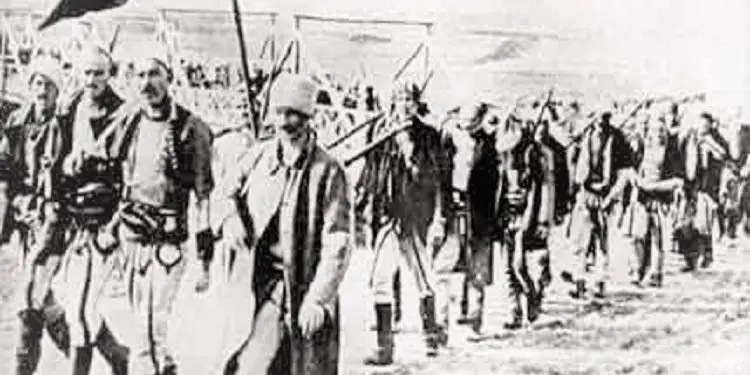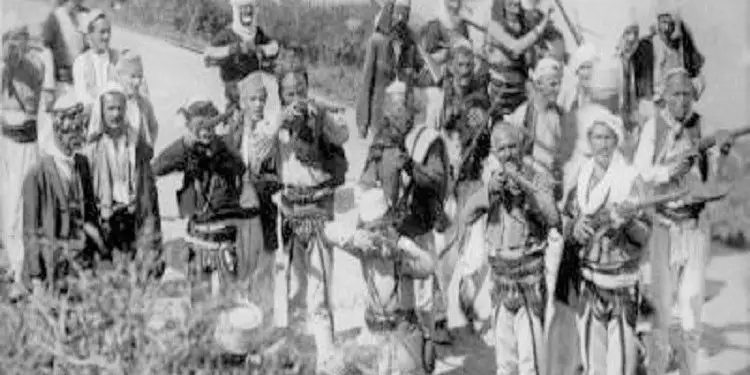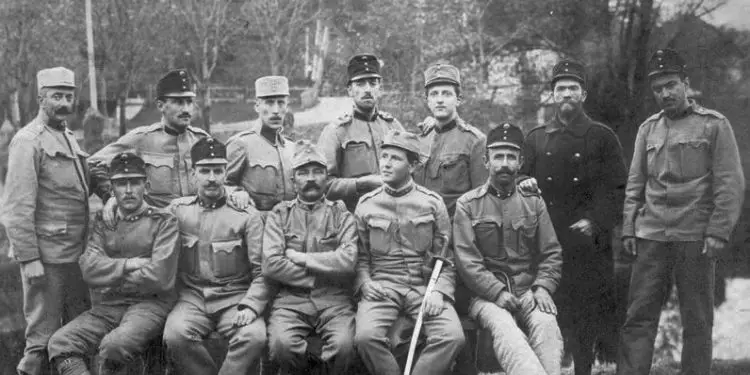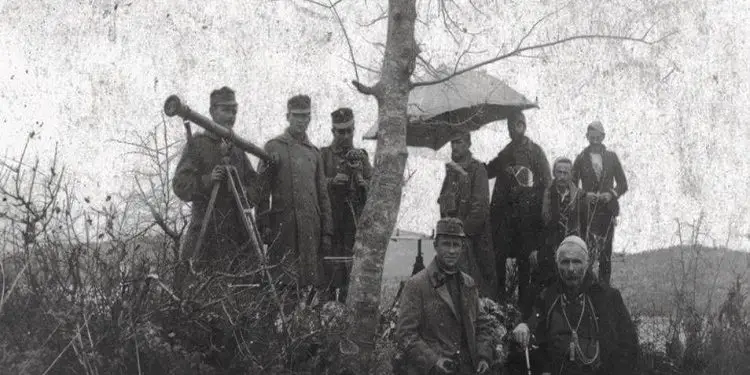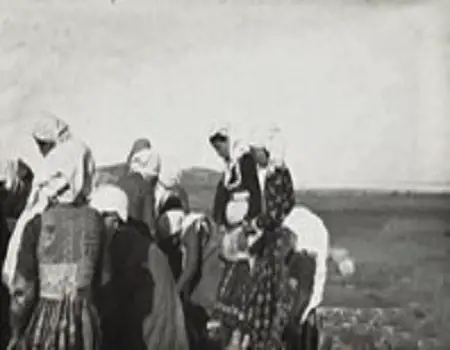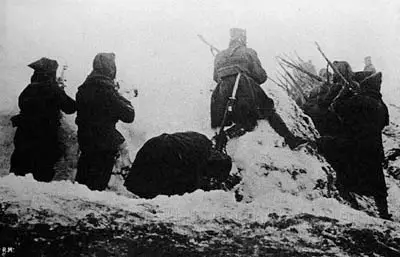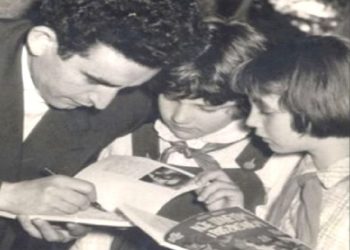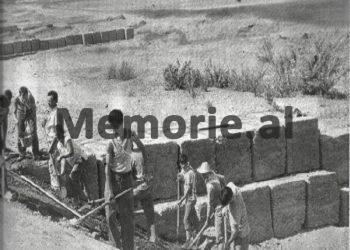From Bashkim Trenova
Part fifteen
MYTH-MYSTICISM, VICTIMOMANIA, RACISM AND SERBONOSTALGIA
ALBANIANS ACCORDING TO THE SERBS
(THE EASTERN CRISIS AND THE BALKAN WARS)
Memorie.al / “Serbs are descended from the Slavs, a large number of tribes who gave life to the Slavic peoples. Knowledge about the origins of the history of the Slavs is modest and not so clear. Their name appears for the first time in the 6th century AD, when Byzantine writers start talking about the Slavs….”! (Dushan Bataković, Milan St. Protic, Nikola Samardžić, Aleksandër Fotic. History of the Serbian People. L’Age d’Homme. Lausanne. 2005. Pg. 3.)
Continues from last issue
Self-help; 30.10.1912. (Declaration of the head of the Serbian government, Nikola Pashič, given to the correspondent of the French newspaper “Temps”):
Those who think that peace can be ensured by the creation of an autonomous Albania are wrong. These tribes even today lead a primitive and uncultured life, they are at enmity with each other, and they have historically never had any common life. These tribes are divided into three religions, they do not have their own literature, not even an alphabet; it is clear that they cannot have an independent development.
So the best solution would be to treat the Albanians in the same way as in the Middle Ages: then they were part of the states of Byzantium and Serbia, without special privileges, but their language and individuality were respected.
Serbia seeks an exit to Shengjin, Lezhë and Durrës, which the Serbian empire had in the middle Ages.
****
Evening news; 20.9.1912:
After the first and second migrations, Serbs became very rare in Old Serbia. Degenerate and uncultivated livestock Arnauts descended on the soft abandoned Serbian lands.
—
Evening news; 22.10.1912:
The bishop of Nish, Mr. Domentijan, visited the wounded in Nis. The wounded gratefully received gifts from the hands of the bishop, promising that after recovery they will go back to the battlefield to slaughter the Turks and cut down the Albanians.
****
Vesnik srpske crkve; July 1912:
God grant that this flag may spread the glory of the new liberators of the oppressed Serbian people from Thessaloniki to Budim and from Sinji to the White Sea, through Bitoshë and across the mountains of Sharri.
—
Vesnik srpske crkve; January-February 1913, page 9:
Aware that it has to fight for the liberation of the still unliberated parts of the Serbian people, our people have the right to prepare for the next war in peace.
—-
Vesnik srpske crkve; January-February 1913, p. 73 and 75:
To write about church life is impossible without talking about social and state life. This is obvious to anyone who has the slightest knowledge of the Serbian church, because it has merged with the state. The year 1912 will be the most important and dearest year for the Serbian people, state and church. This year brought freedom after more than 500 years of captivity to the Serbian people, against whom Asian barbarians and furious Albanians had made a great human slaughter.
In 1912, the Serbian army wrote glorious pages of history with blood and many victims. In 1912, thanks to the Holy Spirit, the alliance of the Balkan states was created, and with faith in God’s help for the right cause, we ran to the holy war.
—
Vesnik srpske crkve; January-February 1913, p.89. (Sermon by the rector of the theological faculty of St. Sava, archpriest S.M. Veselinovic in the Belgrade Cathedral on 16.12.1912):
God rose these days to see his people and pay for the blood of innocent victims. Under the fresh impressions of the war, covered by the numerous notices of the splendid example of the army and arms, we have not thought of our mighty ally.
It is the first moment of this wonder of September 17, an important moment for history and religion at the same time.
The Serbs entered the war guided by heavenly right. And this road was like auspiciousness for a wedding, like a triumphal march through the Balkans.
We see that until yesterday our small homeland, a despised state in the eyes of the powerful, today stands as the most excellent example, as the pinnacle of chivalry and war, as the most noble victor over the vanquished. The only winner, who does not put his sword in his belt with the cry: Woe to the defeated! Without further pretensions, he seeks peace, so that, under the shadow of justice, every citizen of Serbia can live peacefully. With great and extraordinary joy, we look today at the crown of our war glory, of our victorious pride, the crown with which our powerful ally, our God, crowns the Serbian people today. Amen!
—
Vesnik srpske crkve; October-November-December 1912. pg. 1014:
But the Serb is not only merciful to the Serb, he is merciful and shows his love to the enemy as well. Testimony: The Serbian people bring peace and establish justice, protect the rights of everyone in the countries they have conquered, wounded enemy soldiers are treated in hospitals just like the wounded Serbs; the freedom, which our people value above all, it also brings to others, Orthodox, Catholics and Muslims.
—
Vesnik srpske crkve; July-August 1913, p. 481:
Is there a bloodier history than the history of the Serbian people? There really isn’t. Is there a more glorious history than the history of the Serbian people? There really isn’t. Is there a more genius spirit than the Serbian spirit? There really isn’t.
—
Vesnik srpske crkve; September-October 1913, p. 567:
You know from the history of our past that the fate of the Serbian people has been very volatile and changeable. We know that our people came to these parts from their old homeland and settled all over the Balkan Peninsula from the Danube to Thessaloniki, from the Balkan Mountains to the Adriatic Sea. In these territories of his new homeland he found remnants of the old peoples, the Thracians and the Illyrians, but more Greeks, with whom he had to fight and secure for himself the land where he settled forever and began to develop and to be perfected.
Wise and clever, diligent and shrewd, brave and brave, our people quickly, after taking the territories in the Balkans, attracted the attention of all their neighbors; they tried with all their might to repulse the influx of the Serbian people, but the Serbian strength, endurance and tenacity far exceeded all the efforts of the enemy forces and assumed ever greater proportions during the conquests and during the formation of his state as well as the victory of his independence.
III
“CITIZENS” OF THE ALBANIAN GOLGOTA
Aleksandar Dinčič, historian, member of the State Commission for finding and documenting all the secret graves in which the remains of those executed after 1944 are located:
Sick soldiers and officers of the Moravian Division prepared for new combat operations. Due to the aggravated situation on the Serbian-Albanian border, as a result of the more frequent incursions of Arnaut insurgents and the suspicious attitude of neighboring Bulgaria, he was ordered to ensure the protection of the border lines in Kosovo and Metohija and Macedonia.
Arnaut losses are not known. According to reports, 30 insurgents were killed in the positions where the 16th Regiment operated. During the fighting, three villages were also burned, which were known as strong Arnaut strongholds and from whose houses the Serbian soldiers were shot. It is estimated that in front of the 16th regiment, in the battles in Kërrabë, there were about 2000 insurgents. Initially, about 5,000 were calculated, but a part of them did not arrive in time. In the battles against the Arnauts, 135,355 bullets, 12,000 machine gun rounds, 354 artillery shells and 127 bombs were used. (1)
—
After entering Albania, a large disbandment of units began due to winter, snow, hunger, daily attacks by Arnauts and general insecurity.
1 – Aleksandar Dincic. Краћи историят учешћа 16. пешадијског пука “цар никола II” у провом светиском рату (1914–1918). Войноисторијски гласник – здесь издаје. Година издања LXIX. (Brief history of the participation of the 16th infantry regiment in the trip to Albania. Military Historical Magazine – Special Edition. Year of Publication LXIX). Pg. 155-157.
Desertions were widespread, deserting the column or voluntarily surrendering to the enemy. In addition to the rebel Arnauts, the exhausted Serbian soldiers became easy prey for the third Bulgarian division, which was following them in Kosovo and Metohija, partly in Albania. Many of them surrendered and decided to spend the rest of the war as prisoners of war. (1)
****
Dimitrije Tucovic – theorist, one of the leaders of the Serbian socialist movement, founder of the Serbian Social Democratic Party:
Editor friend! These days it is one year since the poor tribes of Arban carried the cross to Calvary. This is the year of the systematic extermination of the Arbanian population in all its lands, which the Serbian army has occupied. For one year, a lot of human blood has been spilled through the mountain gorges and in the Balkan crime fields, it is hard to describe.
…
Those crimes are not the work of individuals, or of personal disposition, but an integral part of the “national” policies of the Balkans.
The Serbian army exterminated the Albanians in that land, which it calls “Old Serbia” and in Arbani, while Bulgaria exterminated the Turks in Thrace and Greece the Turks and Arnauts in Devoll and Çameri. Indeed the Arban tribes have been slaughtered and prostrated, without any protection, so to speak – without any voice for their protection and no protest for their benefit. The voice of the Serbian proletariat, the voice of our Party, was the only voice and the only sign of a human voice participating in the tragic fate of these unfortunate Arban mountaineers, but even this voice could not penetrate as far as it should have.
1 – Aleksandar Dincic. Краћи историят учешћа 16. пешадијског пука “цар никола II” у провом светиском рату (1914–1918). Войноисторијски гласник – здесь издаје. Година издања LXIX. (Brief history of the participation of the 16th infantry regiment in the trip to Albania. Military Historical Magazine – Special Edition. Year of Publication LXIX). Page 162.
The dead Arbanas lay mown down in heaps. Their screams and roars of pain almost equaled the thunder of the cannons. Hands and feet, heads and body parts of Arnauts flew in the air. When the artillery fire ended, the place that had been hit was covered not with corpses, but with the heads, hands and feet of dismembered men, which looked like piles colored red.
The young captives, from the beginning of the combat operations, did not spare a straw of an Arban house without burning and without killing an Arban, even a few-month-old baby. Even now after a year, after a long observation through the burned settlements, from Ristovci to Lerina and from Durrës to Careva Sela, I cannot forget the impression left on me by the red sky over the first village that was burned. .
After the fall of Kumanovo, they took pity on Skopje, the city filled with the endless mass of persecuted Arnauts, who sought to escape from the Serbian army, which entered from the north; but for the most part the Arnauts found death. As if he had risen from the grave of the Middle Ages, that despot in Demir Kapi amused him in a drunken state by throwing the corpses of the slain Arnauts upside down into the river Vardar.
You can’t even talk about normal power. That criminal power does not stop acting against Arnauts as yesterday, as today. Comrade Editor, what that government has done against Arnauts surpasses every criminal imagination, that has been done against that people, in this year alone. As soon as someone suspicious from the Arnauts moved towards the Serbian border, the border commanders massacred him. The Arnaut population in Pejë, Gjakovë and Prizren lives with the psychosis of death day and night. He who closes his eyes to sleep is not sure if he will wake up alive in the morning. It is precisely the time of night that has been chosen to commit the most monstrous crimes against people, who have taken them from their beds and sent them to be shot.
Every arnaut who lived in the strip of land in the so-called Old Serbia, from Mitrovica to Vranje, has disappeared from the face of the earth, the arnauts for every night disappear without a trace, as if they had been torn by hyenas and jackals coming from the rocky caves and to have taken these unfortunate people out of their homes, to gather them and then send them to the appointed places to hang them with a rope. This is not what the hyenas would do with their prey in the River, with unprecedented barbarism, in less than two hours an entire village has been wiped off the face of the earth, a village without people, without villagers, a village in which they had only women with nursing children, girls, sick and old people and children of all ages remained.
At that moment the news of the massacre in the River arrived, true news, but which seems incredible: although the essence of it is the same, it is difficult to listen to the end when someone tells it, but even more difficult to describe for the other read it. Those women and mothers, holding their children up with their hands and condemning them, have prayed: aman commander, what is our fault? Do you tell your wives what you are doing here?
By submitting this letter to you, I believe that you will act in the spirit of socialist democracy and put the government in the right position before public opinion; or announce the pursuit of criminals, or openly stand in solidarity with them. If the government tries to hide even after this public accusation, then the consequences for the Serbian people will be great. The time will come when the Serbs will find themselves before the Court of History and there they will give an account. Those crimes will be remembered from generation to generation, just like Bartholomew’s Night, Sicilian Evening, Kishnjeva, etc., just like Demir Hisari and Doksati will be remembered. (1)
1 – Dimitrije Tucovič, “Radničke Novine” no. 223, October 22, 1913. See also Sabrana dela (Selected works). Belgrade 1980, lib. 7, p. 160-164.
—
When the Serbian troops destroyed the village of Topojan, there were no men there. The reserve officers, who received orders to burn the village and stab them with knives, protested in vain, repeated the words “everyone?” “All of them” – was the answer of a certain captain Jurishic. In two hours, 500 souls were killed. The “wild” Albanians disarmed and released our captured soldiers, while our “cultured” army of the 20th century is killing their children as well.
While a soldier, named Vuksanovic, recounts the massacres as follows: “At first we killed the Albanians with rifles and pistols, but soon the order came that there was no point in wasting ammunition, so the Albanians will be slaughtered with knives. And so they were divided into groups, lined up in rows with their faces turned towards each other, and then the officers and non-commissioned officers stabbed the Albanians one by one in the neck.
These unfortunate people didn’t even play from their seats, didn’t scream, didn’t defend themselves, they were almost not conscious human beings, but they calmly watched as their friend was stabbed to the throat. I could not imagine such human coolness and endurance of those who looked at death with open eyes. This is one of the most terrifying scenes I have experienced during the wars.
Several generations of Albanians must die to forget what the Serbs have done to them”. (1) The fact must be emphasized that the armies, which penetrated from all four sides into the provinces of old Turkey, committed more crimes there in one year than the Sultan’s army would commit in 100 years. They burned, slaughtered, kidnapped and deserted. (1)
—
She pushed our troops through Albania last fall and they came out in half in the Adriatic Sea. For Pašić, apparently, a few thousand human victims are a small thing. (2)
—
Hundreds and thousands of our soldiers were sacrificed, who left their bones in the impassable mountains of Albania. The Serbian people paid for the madness of their leaders with the blood and lives of their best sons. (2)
—
In the snowy mountains of western Old Serbia and Albania, fighting takes place, houses are on fire, villages are destroyed. Theremi with neighbors, half of whose population remains in our new borders. (3)
1 – Dimitrije Tucovic. Radničke novine; October 22, 1913.
2 – Dimitrije Tucevic. Sabrana dela (Selected works). Book 4. Pg. 142.
It doesn’t matter where you start from to reach the strategic points of Albania; the roads are all the same, they all lead to that country. All of them, even before this last war with the Albanians, were planted with the graves of Serbian soldiers. With the new march to Albania and to its strategic points, the government has started to renew and enlarge this cemetery. It does not listen to the voice of that people who have been fighting for a year, shed blood, leave their bones and health on the field of war and who at home are waiting for hunger, winter, pain and misery, but listens to the voice of the bourgeoisie, which never “the vast homeland to plunder” is enough for him.
To get drunk on the laurels of victory and the illusions of brute force and without considering anything to enter into energetic efforts to introduce as soon as possible the young citizens into kneeling political and national slavery, to increase the appetite and interests, which are far from the needs of us all, this is madness of the first degree. (4)
1 – Dimitrije Tucovic. Sobrana came out. (Selected works). Book 7. Page 122. Rad, Belgrade, 1980.
2 – Ibid. Pg. 137.
3 – Ibid. Pg. 141.
4 – Right there. Pg. 143.
—
For two or three hours the village (on the River-our note) was darkened by the scene, which is difficult to describe. The shots knocked down the women who were protecting the babies in their arms, next to the dead mothers their little children were torn, who had accidentally escaped the bullets; bodies like the tall oaks of the highlanders writhed like worms through the ground, the women gave birth to fear. In two hours, 500 lives were lost. What about after? Only what could still be done was done: The corpses were dumped on the paths, which were set on fire – so that the crime could not be traced. (1)
—
During that year, a lot of blood was spilled in the gorges, in the fields, on the vast battlefield of the Balkan Peninsula. But what marks these wars, comparing them with the cruelest and bloodiest of the Dark Ages, are not the streams of blood of one side or the other, of the armed men who fought. No! They are the rivers of blood of the murdered population, which did not take part in the war, of innocent children, of women and peaceful people, of the working people of Old Serbia, Albania, Macedonia and Thrace, the only fault of to whom it is that they pray to God differently, that they speak a different language, that they bear a different name and that in their centuries-old hearth they have suffered, innocently, four wild storms. (2)
—
In the first weeks of the war “with the Turks” there was no night for us; we moved, opened trenches and went towards the lights of the Albanian villages, which were burning. While the Albanian population, if it had not been killed, because it had been able to leave, we pushed it forward and forced it, like a desperate man who sees his house burning, to make a strong stand in Bujanovc and then in Kumanovo fight like a lion. With the fall of Kumanova, all that part of the Albanian population that was pushed forward by the Serbian army, coming down from the north, gathered in Skopje.
Seeking shelter, she mostly found death. As soon as a restless movement was felt among the Albanians towards the Serbian border, the border commanders started slaughtering, the Albanians disappear somewhere every night as if the jackals and hyenas of these areas come around their houses and take these tall people, take them somewhere and suffocate. But even hyenas would have drowned them in a more humane way!…You Serbia, where are you going and where are you going to stop…? Memorie.al
1 – Dimitrije Tucovic. Sobrana dela (Selected works). Book 7. Rad, Belgrade, 1980. Pg. 158-159.
2 – Right there. Pg. 160-161.
The next issue follows




